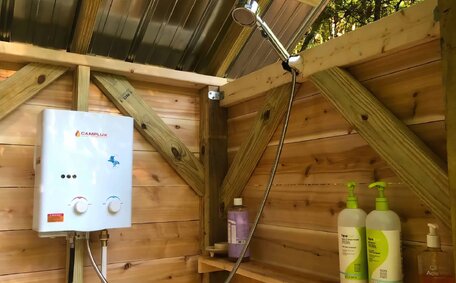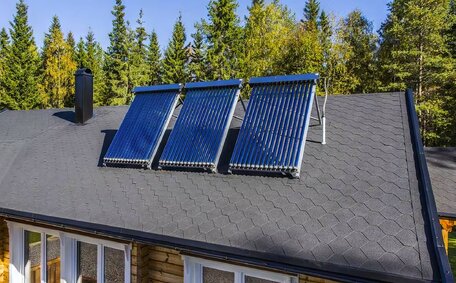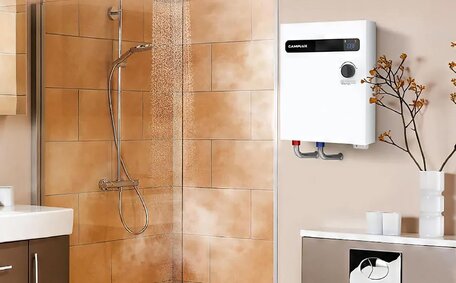What Is Natural Gas and Why Is It Used?
Shale gas, primarily composed of methane, is a natural gas obtained from fossil fuel reserves. It formed underground over millions of years from decomposing organic matter. Natural gas used in domestic and commercial settings is recognised as a clean-burning energy source, monitored for environmental impact by agencies such as the United States Environmental Protection Agency.
LPG, derived from natural gas reserves, is an efficient fuel choice, producing fewer carbon dioxide emissions than other fuels such as coal or oil. It’s also domestically abundant, producing lower levels of nitrogen dioxide than other fuels, making it a secure and reliable energy solution.
When using natural gas for applications like stoves and heaters, always dial before you dig to ensure safety and cost-effective operations. An odorant is added to help detect leaking gas quickly and can also aid in detecting issues with air quality. Regular maintenance and diligent checks around your gas meter and proper operation of gas appliances, in line with usage guidelines, are essential for minimising safety risks.
The Physical Properties of Natural Gas
Natural gas, used in appliances like water heaters and associated with less air pollution, has some key physical properties that are important to understand for safety. Methane is the principal component of natural gas, generally making up 70-90% of its composition.
Unlike gases that are heavier than air, natural gas is lighter. In its pure form, there’s no colour, odour, or taste to natural gas, making detecting leaks more challenging without added odorants.
Since natural gas is lighter than air, it disperses upwards rather than accumulating at ground level, reducing risk during a leak. This helps maintain the safe use of your gas by reducing the risk. However, to be safe do consider that gas can collect in enclosed spaces which poses an explosion risk if ignited.
Natural gas having no colour, odour or taste also poses risks as leaks of hazardous air pollutants are harder to detect. This necessitates the addition of odorants, such as mercaptans, to assist in leak detection and prevent potential health hazards. These add a distinct “rotten eggs” smell so people notice a potential natural gas leak, even when small.
Our video explains how the odorant in gas aids in leak detection, protecting human health through proper ventilation and appliance testing. If a gas leak is suspected, evacuate the area straight away and dial before dig, then contact the fire brigade and your utility gas supplier, to learn more about protocols like those recommended by the Chan School of Public Health.
Odorants Added to Natural Gas for Safety
In its pure form, natural gas doesn’t have any odour, colour or taste, which poses health risks without the addition of odorants. This makes detecting leaks very difficult. To improve safety, odorants are deliberately added to give natural gas a distinct "rotten egg" smell.
The most common odorant used is mercaptan, a non-toxic chemical detectable in extremely low concentrations or parts per million. Adding mercaptan means that people can smell a gas leak right away, allowing quick evacuation and operations to be turned off before dangerous build ups occur.
If you detect a 'rotten egg’ odour of gas, urgently follow these steps:
- Evacuate the area and get to fresh air
- Call 000 for emergency services
- Contact your utility provider to shut off your gas supply
- Do NOT use phones, turn on/off appliances or lights, or do anything that could cause sparks
Odorants like mercaptans enable early detection of natural gas leaks, mitigating potential risks. But you should still take that rotten egg small very seriously and act fast for safety.
Detecting and Responding to Natural Gas Leaks
Detecting a gas leak quickly is critical for safety. Pay attention for the distinct "rotten egg" smell that has been added to natural gas. Sniff near appliances and gas lines to check for leaks.
If you detect a gas leak inside your home or business:
- Evacuate immediately and get everyone to fresh air outside
- Call 000 to request emergency services
- Contact Cranebrook Plumbing at 1300 349 338 to shut off the main gas supply
- Do NOT turn on/off appliances, lights or phones, or do anything that could cause sparks
If you detect a gas leak outdoors:
- Avoid the area and keep at least 15 metres away
- Call 000 for emergency crews and contact your gas utility provider
- Warn others away from the area until help arrives
In any gas leak situation, dial before you plan any actions and stay away from the leak to avoid igniting it. Leave gas shutdown and inspection to qualified professionals like Cranebrook Plumbing.
Using Natural Gas Appliances Safely
The safe and efficient use of your gas appliances is integral to overall safety. Always follow the manufacturer’s instructions for operating your cooking gas appliances like ovens, cooktops, and space heaters. Key tips include:
- Ensure adequate indoor air ventilation when appliances are running
- Regularly get your stove serviced by a licensed gasfitter for optimal safety and performance
- Check flexible hoses for wear/tear and replace if needed
- Clean burners, pilot lights and filters as per instructions
- Avoid using gas stoves as a substitute for room heating
- If you still smell gas, turn off your gas appliance and contact Cranebrook Plumbing immediately
DIY installations or repairs on gas appliances can increase the risks of leaks, explosions, and gas poisoning; it’s crucial to enlist the services of licensed gas professionals. Our licenced technicians at Cranebrook Plumbing handle all gas work. We check for leaks, replace worn parts and ensure optimal, safe functioning.
Use appliances as intended, maintain them rigorously, and promptly consult experts at the slightest sign of trouble.
Regular Maintenance for Natural Gas Systems
Regularly maintaining natural gas appliances is essential for safe and efficient operation in homes and businesses.
Cranebrook Plumbing provides thorough gas services to detect and fix any potential hazards before they escalate. Our licenced technicians check all key components, including:
- Gas pipeline - Check for leaks or corrosion
- Your gas stove - Clean, test for carbon monoxide and ensure optimal performance
- Flues and vents - Ensure adequate ventilation for safe operation
- Gas fittings - Tighten connections and replace any worn parts
Schedule annual maintenance of your natural gas systems before winter each year to prepare for increased usage. Some key reasons regular maintenance is vital include:
- Prevent gas leaks which can cause explosions
- Reduce risk of carbon monoxide poisoning from improper appliance operation
- Improve efficiency and help lower running costs
- Prolong appliance lifespan through preventative care
To ensure the efficient natural gas use in systems powering your home or business premises, arrange regular maintenance from qualified experts at Cranebrook Plumbing. This small investment in time and money helps avoid catastrophic incidents and keeps your gas appliances running with health and safety all year long.
The Environmental Impact of Natural Gas
While Although cleaner burning compared to coal and oil, natural gas has environmental impacts due to methane emissions upon extraction, transport, and use. Natural gas, often extracted through methods like hydraulic fracturing, is mostly methane, which has gained attention due to its release into atmosphere and its potency as a source of greenhouse gas emissions.
Gas development can sometimes lead to methane leaks, which negatively impact air quality and contribute to atmospheric carbon monoxide levels. Research suggests the gas industry’s methane emissions are higher than previously estimated, a concern reflected in our updated page with current findings. Natural gas burned in applications also emits carbon dioxide, albeit less than coal.
There is ongoing debate regarding the levels of carbon monoxide emissions from the usage of natural gas. Natural gas is considered the cleanest form of fossil fuel and is championed as essential for reducing emissions while transitioning away from more polluting energy sources. Critics argue that without environmental protection measures, gas infrastructure growth locks society into further fossil fuel dependence, delaying essential climate change action.
Consumers can mitigate natural gas’s environmental impact by adopting safety measures, enhancing energy efficiency and adopting renewable energy where possible. Expert servicing from Cranebrook Plumbing also helps to reduce leaks in local gas utilities.
Natural Gas Safety Tips for Your Home
Using natural gas safely at home requires ongoing diligence. Here are some key safety tips:
- Perform routine sniff tests near appliances and gas pipelines to detect any leaks.
- Arrange annual safety inspections for your gas system with Cranebrook Plumbing.
- Follow manufacturer guidelines for proper appliance use and care.
- Keep vents and exhaust flues unobstructed; they are crucial for air quality and ventilation.
- Install carbon monoxide detectors for early warning of appliance issues.
- If your detectors signal a gas presence or if you suspect a leak, if feasible, shut off the gas supply, evacuate and contact emergency services by calling 000.
By learning to talk about gas safety, regularly maintaining your system, and contacting experts like Cranebrook Plumbing at the first sign of trouble, you can continue to use natural gas as an efficient, domestic fuel source while keeping risks to a minimum.






